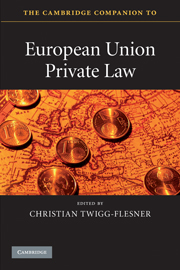Book contents
- Frontmatter
- Contents
- Preface
- List of Contributors
- Table of cases
- Table of legislation
- 1 Introduction
- 2 The historical evolution of European private law
- 3 European private law and the comparative method
- 4 The role of the conflict of laws in European private law
- 5 Competence and European private law
- 6 Language and terminology
- 7 European private law by directives
- 8 The European Court of Justice as a motor of private law
- 9 European contract law
- 10 The way forward in European consumer contract law
- 11 Commercial contracts and European private law
- 12 European tort law
- 13 European Union property law
- 14 Information obligations and withdrawal rights
- 15 Travel law
- 16 Unfair contract terms
- 17 Unfair commercial practices and European private law
- 18 Consumer sales and associated guarantees
- 19 Product liability
- 20 Commercial agency in European Union private law
- 21 EU competition law and European private law
- 22 Non-discrimination and European private law
- 23 Financial services in European Union private law
- Further reading
- Index
17 - Unfair commercial practices and European private law
Published online by Cambridge University Press: 05 July 2015
- Frontmatter
- Contents
- Preface
- List of Contributors
- Table of cases
- Table of legislation
- 1 Introduction
- 2 The historical evolution of European private law
- 3 European private law and the comparative method
- 4 The role of the conflict of laws in European private law
- 5 Competence and European private law
- 6 Language and terminology
- 7 European private law by directives
- 8 The European Court of Justice as a motor of private law
- 9 European contract law
- 10 The way forward in European consumer contract law
- 11 Commercial contracts and European private law
- 12 European tort law
- 13 European Union property law
- 14 Information obligations and withdrawal rights
- 15 Travel law
- 16 Unfair contract terms
- 17 Unfair commercial practices and European private law
- 18 Consumer sales and associated guarantees
- 19 Product liability
- 20 Commercial agency in European Union private law
- 21 EU competition law and European private law
- 22 Non-discrimination and European private law
- 23 Financial services in European Union private law
- Further reading
- Index
Summary
Two distinct areas of law?
Unfair commercial practices and private law seem to be two distinct areas, clearly separated by their different functions. Commercial practices law regulates the correct behaviour of companies in the market in order to ensure fair competition, whereas private law deals with contractual and non-contractual obligations. However, such a statement is only partly correct. Some Member States would regard the law on commercial practices as belonging to private law despite its different functions, while others would underline the regulatory function of commercial practices law which makes it different from private law. At the EU level, such a dividing line never existed as EU private law is regulatory law. It regulates either particular sectors of the economy or it aims at the protection of particular parties, such as consumer or trade representatives. This chapter will try to show how close the two areas have come.
From piecemeal to comprehensive regulation
The legislation on commercial practices dates back to 1984, when the EU adopted the Misleading Advertising Directive (84/450/EEC) which sets minimum standards for business-to-business (B2B) and business-to-consumer (B2C) relations. Under pressure particularly from the United Kingdom, the original proposal of the European Commission, which was meant to cover unfair advertising as well, was abandoned. The Comparative Advertising Directive (97/55/EC) set an end to differing standards on the admissibility and the legality of comparative advertising. Fully harmonised EU rules define the legal framework under which companies are allowed to compare their products with those of their competitors to the benefit of consumers. Just before the beginning of the new millennium, the European Commission was ready to make a fresh start on convincing Member States that the internal market needed fully harmonised EU rules on unfair advertising. After six years of highly controversial debate, the European Community managed to adopt the Unfair Commercial Practices Directive (2005/29/EC) (the UCPD). Since 2005, there is no longer a coherent regime of EU rules with either personal or factual scope. The UCPD aims at the protection of consumers only against unfair and commercial practices. The new Misleading Advertising Directive (2006/114/EC) defines the legal framework for B2B relations. It lays down mere minimum standards only in the field of misleading advertising, and even here, it is less progressive than the much higher standards of protection granted to consumers under the UCPD.
- Type
- Chapter
- Information
- The Cambridge Companion to European Union Private Law , pp. 229 - 242Publisher: Cambridge University PressPrint publication year: 2010
- 7
- Cited by

